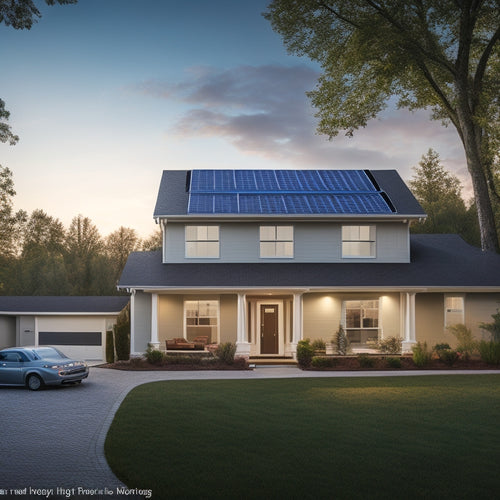
7 Best Residential Power Systems Online Today
Share
You're looking for the best residential power systems to optimize your energy independence and reduce your carbon footprint. From solar and wind power to off-grid solutions, you have various options to choose from. Top-rated residential solar kits offer efficient energy harvesting, while high-efficiency solar panel systems provide maximum energy output. Off-grid power solutions and battery backup systems guarantee energy autonomy, and affordable renewable energy options make it easier on your wallet. As you explore these options, you'll discover the perfect system tailored to your needs, taking you one step closer to a sustainable future.
Key Takeaways
• Grid-tie systems allow homeowners to generate clean energy and sell excess back to the grid, reducing energy bills and increasing property value.
• Off-grid power solutions incorporating solar, wind, and hydro power provide energy autonomy in remote areas, reducing reliance on fossil fuels.
• Energy storage options, including battery backup systems, are essential for off-grid systems, storing excess energy for low production periods and ensuring uninterrupted access.
• Affordable renewable energy options, such as solar power systems, minimize carbon footprint, decrease dependence on fossil fuels, and offer energy incentives and tax credits.
• Eco-friendly energy storage solutions, like green batteries, optimize solar power system performance, reducing reliance on the grid and creating a sustainable energy grid.
Top Rated Residential Solar Kits
When shopping for a solar power system, you'll likely come across a wide range of residential solar kits that claim to offer high-quality performance and value. To guarantee you make an informed decision, it's crucial to assess the top-rated residential solar kits based on their efficiency, durability, and cost-effectiveness.
Look for kits with high-efficiency solar panels, robust mounting systems, and advanced inverters that maximize Solar Savings. Additionally, consider the installation process and opt for kits that come with detailed Installation Tips and dedicated customer support.
A top-rated residential solar kit should provide a seamless installation experience, minimizing the risk of errors and ensuring a quick return on investment. Moreover, a reliable kit should be designed to withstand various environmental conditions, including extreme temperatures, wind, and humidity.
Best Off-Grid Power Solutions
When exploring the best off-grid power solutions for your residential needs, you'll want to assess the most efficient renewable energy sources.
Weigh the benefits of grid-tie systems against the importance of reliable energy storage options.
Your goal is to create a seamless, self-sustaining power system that meets your energy demands.
Renewable Energy Sources
Renewable energy sources, such as solar, wind, and hydro power, have emerged as the most reliable and efficient off-grid power solutions, offering you a clean and sustainable alternative to traditional fossil fuels.
As you explore off-grid power solutions, you'll find that these renewable energy sources are becoming increasingly cost-competitive with traditional energy sources. Wind farms, for instance, are becoming more efficient, making wind power a viable option for remote areas.
Geothermal potential is also being harnessed to provide heat and electricity, particularly in regions with significant volcanic activity. When combined, these renewable energy sources can provide a reliable and sustainable power supply.
By leveraging these alternatives, you can reduce your reliance on fossil fuels and lower your carbon footprint. With the cost of renewable energy decreasing, it's an ideal time to contemplate integrating these sources into your off-grid power system.
Grid-Tie Systems Benefits
Grid-tie systems, which synchronize your renewable energy output with the grid's frequency, allow you to sell excess energy back to the utility company and offset your energy costs. This means you can generate your own clean energy and reduce your reliance on the grid. As a homeowner, you can benefit from grid-tie systems in several ways.
| Benefits | Description |
|---|---|
| Energy Savings | Reduce your energy bills by generating your own clean energy |
| Increased Property Value | Boost your property value with a grid-tie system installation |
| Environmental Benefits | Contribute to a sustainable future with green technology |
Energy Storage Options
When planning an off-grid power system, you'll need to explore energy storage options that can effectively store excess energy generated by your system during the day for use during periods of low energy production or at night. Energy storage systems, such as batteries, are essential for off-grid power systems as they provide a buffer against power fluctuations.
You'll want to explore energy storage options with high energy densities, which allow for more energy storage in a smaller footprint. This is particularly important for residential power systems, where space is often limited.
When selecting an energy storage system, evaluate the type and quality of the batteries, as well as the charging and discharging rates. Look for systems with advanced battery management systems that can optimize energy storage and minimize power losses.
Additionally, consider the scalability and flexibility of the energy storage system, as your power needs may change over time. By carefully assessing energy storage options, you can establish a reliable and efficient off-grid power system that meets your needs.
High-Efficiency Solar Panel Systems
You can significantly reduce your reliance on the grid by integrating high-efficiency solar panel systems into your residential power setup, which is particularly advantageous for homeowners seeking to minimize their environmental footprint. By selecting high-efficiency solar panels, you can maximize your energy production while minimizing the space required for installation. This is especially important for homeowners with limited roof space.
When selecting a high-efficiency solar panel system, it is important to take into account the Energy Efficiency Standards of the system. Look for systems with high energy conversion rates and low temperature coefficients to guarantee excellent performance.
Here's a comparison of some high-efficiency solar panel systems:
| System | Efficiency Rate | Temperature Coefficient |
|---|---|---|
| Panasonic HIT-240 | 21.8% | -0.29%/°C |
| SunPower X-Series | 22.8% | -0.29%/°C |
| LG NeON 2 | 20.5% | -0.38%/°C |
| Hanwha Q CELLS | 20.3% | -0.39%/°C |
| Trina Solar Tallmax | 20.2% | -0.40%/°C |
Regular Solar Panel Maintenance is vital to ensure excellent performance and extend the lifespan of your system. Regular cleaning, inspection, and monitoring can help prevent energy losses and identify potential issues early on.
Residential Battery Backup Systems
As you contemplate residential battery backup systems, you'll want to analyze backup power sources that can keep your home running during outages.
You'll also need to determine the energy storage capacity required to meet your specific needs.
Backup Power Sources
Residential battery backup systems provide a reliable source of backup power during outages, allowing homeowners to maintain essential household functions. You can rest assured that your lights, refrigerator, and other crucial appliances will keep running even when the grid goes down. These systems typically consist of a battery bank, an inverter/charger, and a monitoring system. They're designed to automatically switch on during a power outage, providing a seamless changeover to backup power.
In addition to battery-based systems, fuel cells are another viable option for backup power. Fuel cells convert chemical energy into electrical energy, offering a clean and efficient source of backup power. They're particularly useful for longer-duration outages, as they can be fueled by natural gas or propane.
Energy Storage Capacity
When selecting a residential battery backup system, determining the required energy storage capacity is crucial to guaranteeing your backup power needs are met during an outage. You'll want to calculate your energy storage requirements based on the total wattage of your essential appliances and the duration you need backup power.
A higher power density is desirable, as it allows for more energy storage in a smaller footprint.
To guarantee energy reliability, consider a system with a high depth of discharge (DOD), which allows you to utilize more of the battery's capacity. A higher DOD means you'll get more usable energy from your batteries.
Additionally, look for systems with advanced battery management systems (BMS) that can monitor and control the charging and discharging of your batteries, ensuring excellent performance and longevity.
Grid Independence Options
You can achieve grid independence by opting for a residential battery backup system that integrates seamlessly with your existing infrastructure, providing a reliable source of power during outages. This means you'll have energy freedom, even when the grid is down.
With a battery backup system, you can store excess energy generated by your solar panels or wind turbines, and use it when you need it most. This level of energy autonomy is especially valuable for homeowners who live in areas prone to natural disasters or frequent power outages.
When paired with home automation systems, your residential battery backup system can optimize energy distribution and consumption. For instance, during an outage, your system can automatically switch to backup power, ensuring your critical appliances and devices remain operational. You'll enjoy uninterrupted access to essential services like refrigeration, lighting, and communication.
Affordable Renewable Energy Options
Utilizing affordable renewable energy options is essential for homeowners looking to decrease their dependence on fossil fuels and minimize their carbon footprint. As you consider making the shift, it's important to explore available energy incentives that can help offset the upfront costs.
You can benefit from federal and state tax credits, rebates, and grants that encourage the adoption of renewable energy systems. Additionally, green financing options, such as property-assessed clean energy (PACE) programs, can provide access to low-interest loans or financing with favorable terms. These incentives can greatly reduce the initial investment required to install renewable energy systems, making them more accessible to homeowners.
Solar Power Systems for Homes
Solar power systems for homes harness energy from the sun, converting sunlight into electrical current through photovoltaic (PV) panels mounted on rooftops or in open spaces. As you contemplate installing a solar power system, you'll want to explore the various options and features that can optimize your energy production and consumption.
One key aspect to ponder is home automation, which allows you to monitor and control your energy usage remotely. With smart home automation, you can adjust your energy consumption in real-time, ensuring you're making the most of your solar power.
Energy monitoring is another pivotal aspect of solar power systems for homes. You'll want to track your energy production and consumption to identify areas for improvement. Advanced energy monitoring systems provide real-time data, enabling you to make informed decisions about your energy usage.
Eco-Friendly Energy Storage Solutions
Eco-friendly energy storage solutions, like advanced battery systems, play an essential role in optimizing your solar power system's performance by storing excess energy generated during the day for use during periods of low sunlight or at night. This is particularly important for homeowners who want to maximize their renewable energy output and reduce their reliance on the grid.
When it comes to selecting an eco-friendly energy storage solution, you'll want to take into account the type of battery technology, depth of discharge, and round-trip efficiency. Here's a comparison of some popular green batteries:
| Battery Type | Depth of Discharge | Round-Trip Efficiency |
|---|---|---|
| Lead-Acid | 50% | 80% |
| Lithium-Ion | 80% | 95% |
| Sodium-Ion | 70% | 90% |
| Flow Battery | 90% | 85% |
As you explore eco-friendly energy storage solutions, consider the advantages of sustainable grids. By integrating green batteries into your solar power system, you can create a sustainable grid that reduces your carbon footprint and increases your energy independence. With the right energy storage solution, you can enjoy a reliable and efficient power supply that's good for you and the planet.
Frequently Asked Questions
Can I Install a Residential Power System Myself?
You can attempt to install a residential power system yourself, but be aware of DIY challenges like complex wiring and Safety Concerns, such as electrical shock and fire hazards, which may outweigh potential cost savings.
Do Solar Panels Work Efficiently in Shaded Areas?
You'll find that solar panels struggle in shaded areas, as tree coverage reduces energy output. Optimize your roof orientation to minimize shade, ensuring maximum efficiency, but be prepared for reduced performance in heavily shaded areas.
Are There Any Government Incentives for Renewable Energy?
You'll be intrigued to know that in 2020, renewable energy accounted for 38% of global power generation. Now, regarding government incentives, you can benefit from Tax Credit Extensions and Green Bonds, which encourage investments in renewable energy projects, driving a sustainable future.
Can I Sell Excess Energy Back to the Grid?
You can sell excess energy back to the grid through Net Metering, a policy allowing homeowners to offset their energy consumption. With a Grid Tied system, you'll generate credits for excess energy produced, reducing your utility bills.
How Long Does It Take to Pay off the System?
As you start on this renewable journey, you're likely wondering how long it'll take to reap the financial rewards. A break-even analysis will reveal the timeline, factoring in system costs, local incentives, and your energy savings, to give you a precise payback period.
Related Posts
-

Top Portable Refrigerators for Camping Adventures
When you're camping, having a reliable portable refrigerator can make all the difference for keeping your food fresh ...
-

Top Camping Water Bottles for Adventure
When you're out adventuring, picking the right camping water bottle is essential for staying hydrated. Look for durab...
-

Cost of Solar With Battery Backup
You're investing in a solar panel system with battery backup to guarantee reliable power during outages. The cost of ...


